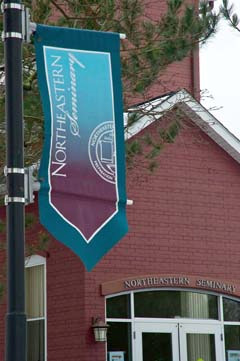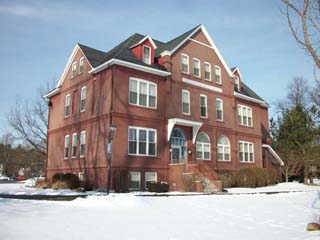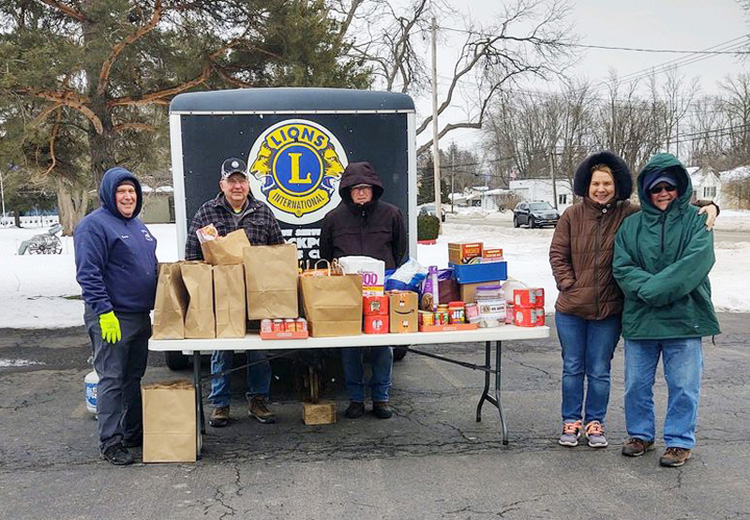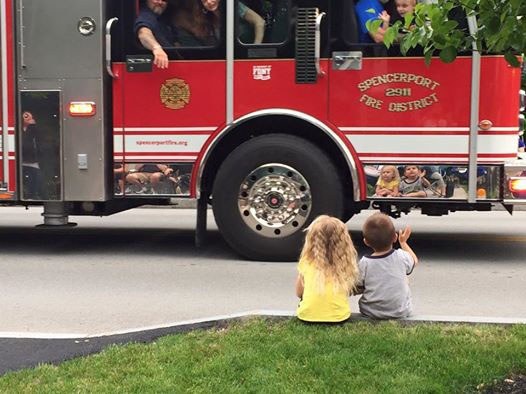Multi-denominational program makes Northeastern Seminary unique
by Kristina Gabalski
 Northeastern Seminary (NES) at Roberts Wesleyan College combines the “unchanging essentials of biblical and historical Christianity,” with a “responsive attitude toward contemporary culture,” to prepare Christ-centered men and women for effective ministry in the church and world.
Northeastern Seminary (NES) at Roberts Wesleyan College combines the “unchanging essentials of biblical and historical Christianity,” with a “responsive attitude toward contemporary culture,” to prepare Christ-centered men and women for effective ministry in the church and world.
The seminary opened in 1998 with a vision to transform the spiritual climate of the Northeast and beyond. It continues to grow in prominence as a significant resource for the church community in upstate New York.
Fr. Scott Caton, a professor of History and Culture and a Roman Catholic priest (ordained in 2011), is a founding faculty member. He credits Dr. Paul Livermore with the vision to have a seminary on the Roberts campus.
“Paul Livermore is an accomplished theologian,” Fr. Caton says, “a wonderful churchman and the unsung hero of the seminary. Northeastern Seminary, humanly speaking, is Dr. Livermore’s vision. We had a clean sheet of paper and wanted to take the vision of Dr. Livermore and create something really special.”
NES is very special. Its 150 students come from more than 30 different Christian denominations, multiple ethnicities and a broad spectrum of ministry aspiration.
Northeastern Seminary is an independent, multi-denominational seminary in its approach to theological education leading to academically and professional accredited degrees: Master of Divinity, Master of Arts in Theological Studies, Master of Arts in Theology and Social Justice, Master of Arts in Transformational Leadership, and Doctor of Ministry. Three hundred NES graduates minister around North America and abroad.
When completing market studies in preparation for opening the seminary, Fr. Caton says NES wanted to fill a void – not be competitive with Colgate Rochester Crozer Divinity School, for example.
The seminary utilizes an innovative and integrated core program. Preparation includes theological understanding, spiritual formation and ministry skills. “Deeply rooted, faithfully responsive” are words used by the seminary to describe its program.
Historical study of Christianity
Students at NES are oriented towards renewal, Fr. Caton says. The seminary focuses on the classical Christian faith – the writings of the Church Fathers that contain a solid Christian tradition all denominations share.
“We’re giving students that kind of a dimension to Christian training,” Fr. Caton explains, “orienting students historically to the historic Christian tradition.” Students progress through the four core courses together, with church history presented in successive modules, Fr. Caton says.
Pastoral theology, Biblical interpretation, social consciousness are all, “integrated historically up to the present day,” Fr. Caton says.
When students start their study from the beginnings of the church, denominational differences that developed over time are erased. “We hold true to the spirit of classical Christianity,” Fr. Caton says, “which transcends different ideologies by going back to the roots and seeing how doctrine develops.”
“We all started in the first century,” he continues. Students from different denominations are shown “their little part of the puzzle as it develops. Everybody sees their connections with each other in a deeper, more viable way.”
Once students understand how different Christian denominations relate historically, they can “understand how their sisters and brothers look at Scripture the way they do,” Fr. Caton says.
Faith sharing
 Roberts Hall on the Roberts Wesleyan College Campus houses Northeastern Seminary. Photograph by Kristina Gabalski.Another vital part of the seminary formation is the integration of a spiritual formation directly into the curriculum, Fr. Caton says.
Roberts Hall on the Roberts Wesleyan College Campus houses Northeastern Seminary. Photograph by Kristina Gabalski.Another vital part of the seminary formation is the integration of a spiritual formation directly into the curriculum, Fr. Caton says.
Students participate in faith sharing groups and receive spiritual direction as part of the curriculum.
“It’s not a Bible study,” Fr. Caton notes. “It opens people’s eyes up (by) breaking down denominational differences. They see the people they are speaking to are really fine Christians,” even though they may be experiencing God differently.
Fr. Caton says the seminary works to evaluate its performance by seeking feedback from graduates.
They tell NES that their seminary experience trained them very well for practical ministry.
Because they have been given a preparation rooted in the classical Christian faith, they have the tools they need to face a world that is always changing, Fr. Caton says.
“They can apply with great wisdom all these tools,” he explains, which allows them to be “very effective” in their chosen ministry.
Fr. Caton calls the “remarkable diversity” – ethnic, racial, male/female, and non-traditional ages at NES – “exhilarating.”
He adds that “the future looks bright for NES,” and that the seminary can play a leadership role in the Christian community by “meeting the need for historic Christianity – whether or not churches know they need it. People realize these values are important. The seminary needs to lead the way. We need to be responsible; we can’t be slaves to the world view. We need to see the depth, treasure and richness of historic Christianity.”
Nurturing the spiritual life
Dr. Douglas Cullum is another founding faculty member of NES and serves as Dean/Academic Vice-President and Professor of Historical and Pastoral Theology at the seminary.
He says that during the development of the seminary, research found that more than 80 percent of recent seminary graduates were satisfied with the academic content of their (preparation) while about the same high percentage were dissatisfied with their own sense of faith in God through Christ.
Amazingly, “Some even personally felt farther away from God” after completing their seminary studies, Dr. Cullum says.
The survey was a factor which prompted NES to create a program with “ongoing attention to nurturing spiritual life that wasn’t cookie cutter or denominational,” Dr. Cullum says.
Because NES is a multi-denominational seminary, Dr. Cullum notes that it doesn’t want every graduate to come out the same way.
He described the spiritual direction that students receive at NES.
The first two years of seminary study include small “faith sharing groups” which provide an “oasis” for students where they can “stop and think about where God might be active in their lives,” Dr. Cullum says.
The small groups help students develop an ability to be attentive and to “… notice and listen to their own sense of God’s presence in their lives,” Dr. Cullum says. He explains that people today tend to be too busy, they might think of God during the high points and in low points, but “where is God in the midst of the ordinary?”
The process proves to be very beneficial, Dr. Cullum says. Data shows that more than 90 percent of graduates feel the seminary’s “emphasis on forming spirituality was the most significant thing – they are extraordinarily pleased,” Dr. Cullum notes.
It gives students a “sensitivity to God’s presence, a theological affirmation that God is always active, that human beings have the capacity to be in touch with God,” Dr. Cullum says.
A theological seminary that prepares men and women for ministry, “… has failed if it only offers a high academic education,” Dr. Cullum explains. “We need to impart content and help people be formed as servants of God in the world.”
Diverse perspectives
Dr. Cullum also addressed the growing trend over the last decade or so of older people coming to the seminary, sometimes after retiring from completely different careers. He says the average age of seminarians has risen to the mid-30s.
The NES model allows people to “develop a community of learners. The first two years are spent with the same group of people,” Dr. Cullum says. “Over that two year span, they become like a little family.”
He says the diversity of ages and denominational backgrounds adds a richness to the classroom.
“You have a 55 or 60-year old looking at a 22-year old – their rich wealth of life experience adds to the classroom experience.”
“We want people to be rooted in the truth as they understand it,” Dr. Cullum continues. When the faith sharing groups meet, students can see that those from other denominations are people of living faith, that “well-meaning good people can be people of faith (and at the same time) disagree on certain issues.”
“We realize every student is called to serve in a constantly changing context of culture,” he notes.
The seminary prepares students with strong roots that enable them to engage in a dynamic culture. “It’s that tension that holds us together,” Dr. Cullum says, “we’re not afraid of culture.”
Expanding the program
Beginning this August, NES will offer graduate-level courses toward Master of Divinity and Master of Arts degrees on the campus of Onondaga Community College (OCC) in Syracuse. Part of its expanding distance-education program, the courses will be offered via video conference, linking the community of learners in Syracuse with Northeastern’s Rochester campus through live video feed.
NES says students at both campuses will be able to interact with each other as well. This classroom format will incorporate on-site small group interactions and periodic chapel services to enhance community and provide instruction in spiritual formation, a distinctive of the NES education.
NES successfully launched a distance-education initiative last fall in Williamsville through the use of video conferencing.
The expansion into Buffalo and Syracuse “reflects the Seminary’s vision to prepare increasing numbers of theologically reflective, spiritually formed and professionally competent persons for ministry,” Dr. Cullum says. “We are pleased to partner with a community-minded organization like Onondaga Community College that clearly shares our vision for serving the members of the greater Syracuse region.”
Northestern Seminary at Roberts Wesleyan College, 2265 Westside Drive, North Chili, New York 14624-1997. 585-594-6802.






